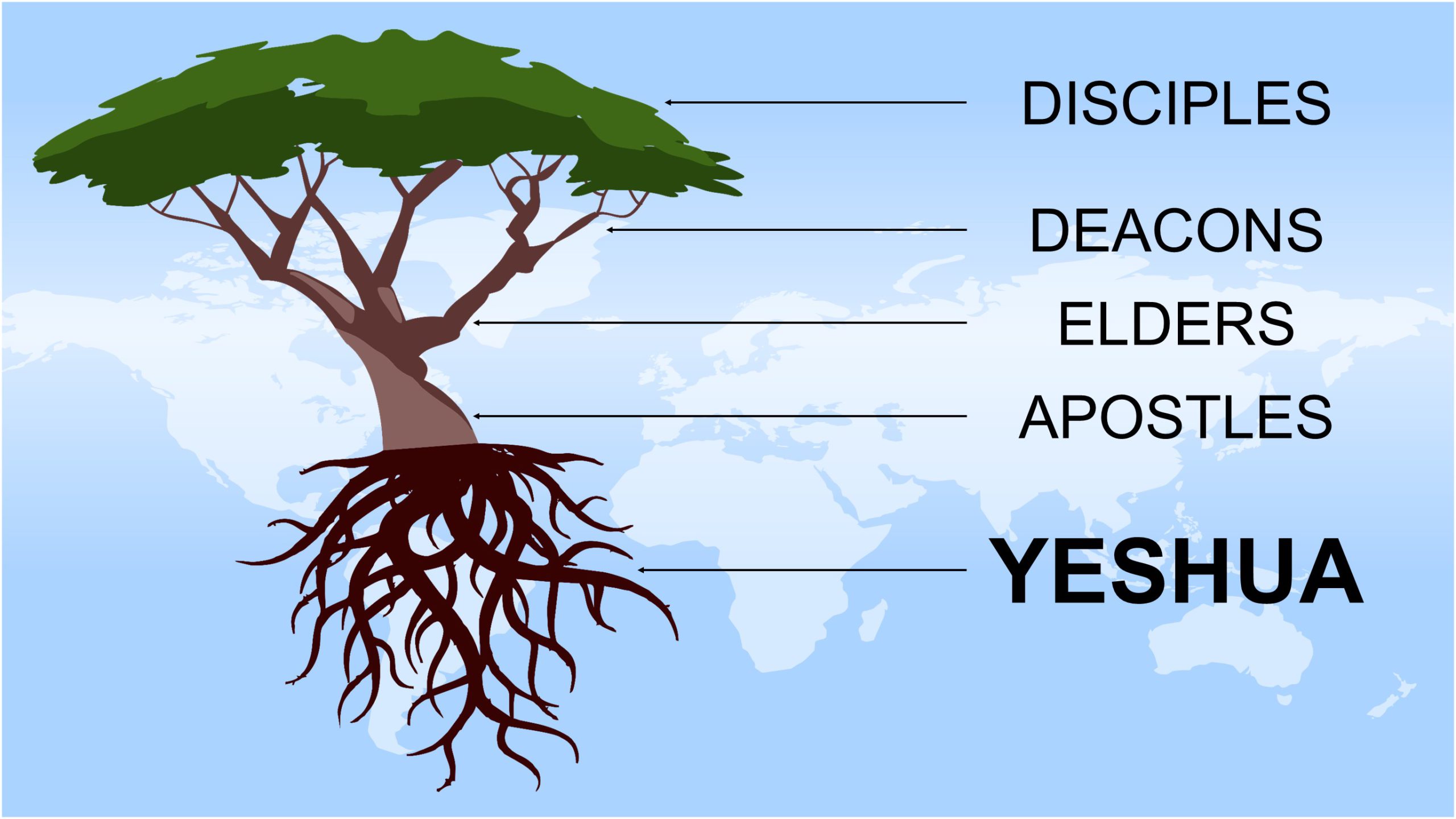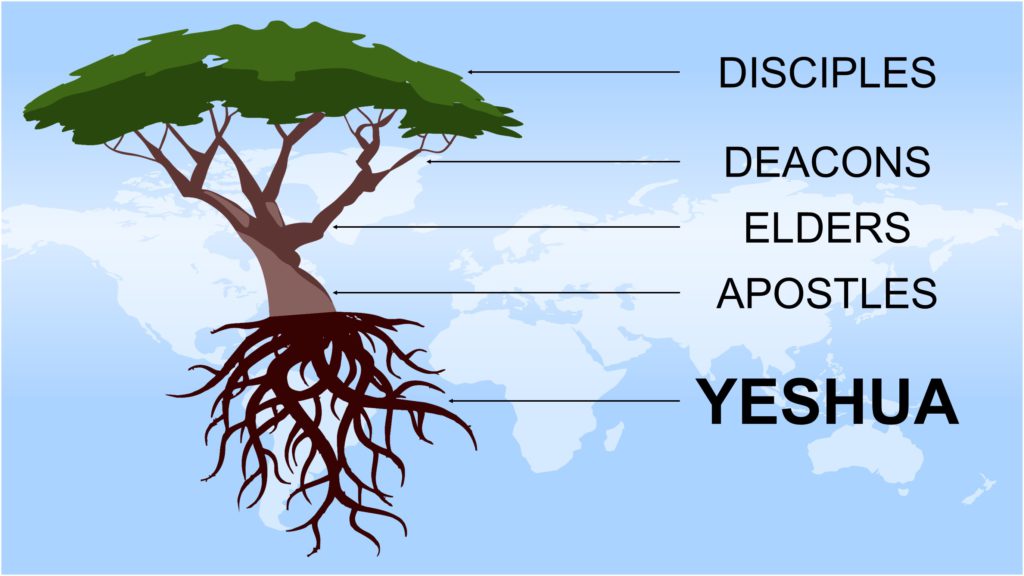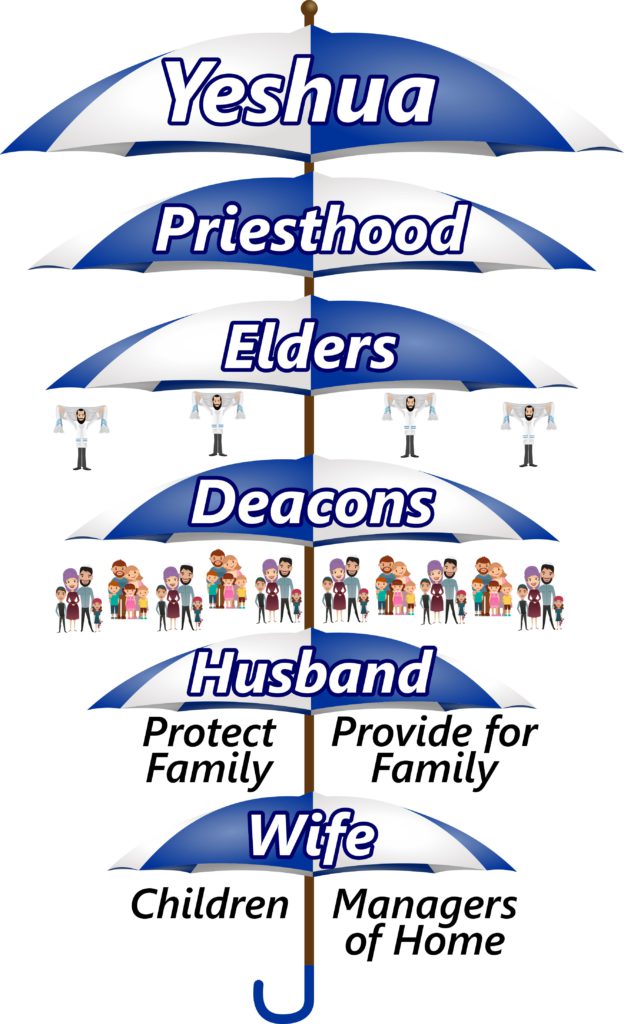
Long before the rabbinical order was created in Babylon, Israel was ruled not by rabbis, but by the most respected elders in each town. These were often the more successful and wealthy men, who also had the respect of the people, because they served as good spiritual examples to the community.
Mishle (Proverbs) 31:23
23 Her husband is known in the gates, When he sits among the elders of the land.
The elders would literally sit in the gates and monitor the activities of their clans, voicing approval or disapproval of the people’s activities. And, it was expected that the people would respect and abide by the decisions of their elders. Deuteronomy even shows us that the elders served as the legal court of justice, and that they had the power of life and death in their municipalities.
Devarim (Deuteronomy) 19:11-12
11 “But if anyone hates his neighbor, lies in wait for him, rises against him and strikes him mortally, so that he dies, and he flees to one of these cities,
12 then the elders of his city shall send and bring him from there, and deliver him over to the hand of the avenger of blood, that he may die.”
The rabbinical order arose in Babylon. Because it was corrupt, Yeshua came to overthrow it, and replace it with His renewed order of Melchizedek. One of many good things this did was that it restores the elder men to their rightful roles as role models and judges, if not for their towns in the dispersion, at least for their spiritual family in Yeshua. (This is why we see our congregations ruled by the elders of the congregation, rather than rabbis.)
Any brother can receive any of the fivefold ministry gifts, should Yahweh wish to give it to him. Any brother can receive the gift of apostleship, prophecy, evangelism, pastoring, teaching, or other gifts which are useful in establishing Yeshua’s kingdom without end. However, the apostolic gift is counted first among these.
Qorintim Aleph (1 Corinthians) 12:28
28 And Elohim has appointed these in the assembly: first apostles, second prophets, third teachers, after that miracles, then gifts of healings, helps, administrations, varieties of tongues.
One reason the apostles are reckoned first is because of the nature of their gift. A true apostle hears in the Spirit, and has a clean understanding of Scripture (and hence, of the doctrine). Because of this, he can be sent out to accomplish whatever task the Spirit assigns him.
[Note: if an apostle cannot hear in the Spirit (or thinks he can, but can’t really), or if an apostle does not display a clean understanding of Scripture (or of the doctrine), it is likely that he is a false apostle. False apostles typically teach false doctrine, and they are sent by some other spirit.]
Let us distinguish the gifts from the roles. While some apostles are called to serve in the separated priesthood, others are not called to serve as separated priests (and yet they still have the gift). Yet due to the nature of the apostolic gift (which is not unlike being a spiritual CEO), an elder with an apostolic gift can establish an assembly, and he can lead the congregation until more qualified elders are found. While elders can have any (or all) of the giftings, only one with an apostolic gifting is able to establish a congregation alone.
Once an assembly is established it is ideally led by three or more qualified congregational elders. (There can be any number of elders, so long as they are truly qualified.) Among the many qualifications for elders is that they love and serve Yeshua’s people as Yeshua Himself did, laying down their lives for them in love and service. For their part, the youth are expected to obey their spiritual elders, humbling themselves to accept loving discipline, so that Elohim may exalt them in due time.
Kepha Aleph (1 Peter) 5:1-7
1 The elders who are among you I exhort, I who am a fellow elder and a witness of the sufferings of Messiah, and also a partaker of the glory that will be revealed:
2 Shepherd the flock of Elohim which is among you, serving as overseers, not by compulsion but willingly, not for dishonest gain but eagerly;
3 nor as being lords over those entrusted to you, but being examples to the flock;
4 and when the Chief Shepherd appears, you will receive the crown of glory that does not fade away. 5 Likewise you younger people, submit yourselves to your elders. Yes, all of you be submissive to one another, and be clothed with humility, for “Elohim resists the proud, But gives favor to the humble.”
6 Therefore humble yourselves under the mighty hand of Elohim, that He may exalt you in due time,
7 casting all your care upon Him, for He cares for you.
Like the clan elders of old, Melchizedekian elders serve as an example first and foremost to the flock, but also to the outside community. They must know how to give a good example of walking in the Spirit. And while they do not necessarily need to know all the fine points of prophecy, in general they must know and live the word well enough that he can exhort and convict those who contradict.
Titus 1:5-9
5 For this reason I left you in Crete, that you should set in order the things that are lacking, and appoint elders in every city as I commanded you —
6 if a man is blameless, the husband of one wife, having faithful children not accused of dissipation or insubordination.
7 For a bishop [elder] must be blameless, as a steward of Elohim, not self-willed, not quick-tempered, not given to wine, not violent, not greedy for money,
8 but hospitable, a lover of what is good, sober-minded, just, set-apart, self-controlled,
9 holding fast the faithful word as he has been taught, that he may be able, by sound doctrine, both to exhort and convict those who contradict.
Apostles select the elders essentially because they give a good witness to the flock and the community of walking Yeshua’s healing walk. That is, they give an example of living connected to Yeshua in the Spirit.
Yochanan (John) 15:4
4 “Abide in Me, and I in you. As the branch cannot bear fruit of itself, unless it abides in the vine, neither can you, unless you abide in Me.”
To extend the analogy, Yeshua effectively planted the Tree of Ephraim, and presently serves as its root. For us to be part of the same tree (or the same vine), we must be set-apart, even as He is set-apart. Yet even so, we have different jobs to fulfill as different parts of the tree (or different parts of the body).

If Yeshua is the Root of Ephraim’s tree, the separated apostles are like it’s trunk. A trunk takes the nutrients and moisture the root sends it, and passes them along to the branches (i.e., the elders), who then support the smaller branches (i.e., the congregational servants, or deacons), who in turn serve and connect the leaves (the people) to the tree. The congregational elders also support the weight of the smaller branches and leaves.
Titus 1:7 says elders must not be greedy. This could be because the elders are to collect the people’s tithes and offerings and use them to conduct the work of the Great Commission in their city. Elders who rule well, and who labor in the word are to be paid twice the average wage of that municipality. This is not so they can enjoy a nice things. Rather, the support takes care of their family’s needs, so they can focus on reaching the people of their city more effectively.
TimaTheus Aleph (1 Timothy) 5:17
17 Let the elders who rule well be counted worthy of double honor, especially those who labor in the word and doctrine.
The idea is for the elders and the people to work together to spread Yeshua’s Good News in their community, so that Yeshua’s name is glorified to the people, and the kingdom grows. This calls for the elders to serve humbly, and for the people to support them, so that each may boast of the other.
Qorintim Bet (2 Corinthians) 1:14
14 (as also you have understood us in part), that we are your boast as you also are ours, in the day of the Adon Yeshua.
If the people and the elders work together to further Yeshua’s kingdom, then it will stand them both well in the day of judgment, as it will be seen that they did what they could with their earthly minas (their earthly lives) to help build Yeshua’s kingdom in the here and now.
Congregational elders can host services, have internet broadcasts, write, or do any doctrinally clean work—but no matter how successful they are, they should not take more than twice the average wage for their salary, seeing as there are so many other needs in the body, including the poor, orphans, widows, missions, schools, etc.
The elders also send a tithe of the tithe (plus gifts, plus offerings) to the priesthood, so that the priesthood can do its part in teaching and connecting all the assemblies globally. This includes doctrinal councils, studies, and much more. While separated priests do not take any salary, it takes funds to carry out these kinds of works in the material world, and the people are the source of this funding. For this to work, the elders must teach the people to be faithful in the tithe. While this is not always popular, those who love Yeshua understand that it costs money to bring glory to Yeshua’s name in the real world, and they are pleased to give to His cause. They know that their sacrifices will be credited to their account, and that this is how Yeshua wants us to build Him a global government without end.
First Timothy 3 gives us some specifics first for bishops (elders), and then for deacons (servants). Both should normally be family men, as both elders and servants serve as examples to the people (and most of the people are married).
TimaTheus Aleph (1 Timothy) 3:1-13
1 This is a faithful saying: If a man desires the position of a bishop [elder], he desires a good work.
2 A bishop then must be blameless, the husband of one wife, temperate, sober-minded, of good behavior, hospitable, able to teach;
3 not given to wine, not violent, not greedy for money, but gentle, not quarrelsome, not covetous;
4 one who rules his own house well, having his children in submission with all reverence
5 (for if a man does not know how to rule his own house, how will he take care of the assembly of Elohim?);
6 not a novice, lest being puffed up with pride he fall into the same condemnation as the devil.
7 Moreover he must have a good testimony among those who are outside, lest he fall into reproach and the snare of the devil.
8 Likewise deacons must be reverent, not double-tongued, not given to much wine, not greedy for money,
9 holding the mystery of the faith with a pure conscience.
10 But let these also first be tested; then let them serve as deacons, being found blameless.
11 Likewise, their wives must be reverent, not slanderers, temperate, faithful in all things.
12 Let deacons be the husbands of one wife, ruling their children and their own houses well.
13 For those who have served well as deacons obtain for themselves a good standing and great boldness in the faith which is in Messiah Yeshua.
Although Matthew 23:9 tells us not to call any man on earth our (heavenly) Father, if we are willing to receive it, the elders play a role like that of spiritual fathers for the congregation. And if the elders can be thought of as the spiritual fathers in the assembly, then the servants (deacons) may be thought of as the older brothers. Their job is to help the elders, and also to serve the people’s needs. If the elders are like the Levitical priests, then the servants are like the Levites, who not only collected the people’s tithes, but who also had other duties in support of the priesthood. If they serve faithfully for a significant number of hours then they can be paid (or partially paid) from the tithes and offerings. And if the elders are to be counted worthy of double honor, then the servants should be counted worthy of single honor (i.e., the going wage in that area).
And while Yeshua’s servants must lead by example, it is also their job to keep the congregation pure. They must send away all those who break the four prohibitions of Acts 15 (regarding idolatry, sexual immorality, strangled meats, and blood). In 1 Corinthians 5 Shaul reprimands the Corinthians for not having done so.
Qorintim Aleph (1 Corinthians) 5:1-5
1 It is actually reported that there is sexual immorality among you, and such sexual immorality as is not even named among the Gentiles — that a man has his father’s wife!
2 And you are puffed up, and have not rather mourned, that he who has done this deed might be taken away from among you.
3 For I indeed, as absent in body but present in spirit, have already judged (as though I were present) him who has so done this deed.
4 In the name of our Adon Yeshua Messiah, when you are gathered together, along with my spirit, with the power of our Adon Yeshua Messiah,
5 deliver such a one to Satan for the destruction of the flesh, that his spirit may be saved in the day of the Adon Yeshua.
This kind of “spiritual excommunication” is only to last until the sinner genuinely repents (e.g., 2 Corinthians 2:8), but what we need to see here is that the authority to put evil out of the midst is restored to the city elders in Yeshua’s Melchizedekian order. This is as it was before the rabbinical order existed.
In the next chapter we will begin to talk about how we are to serve at the family level.
